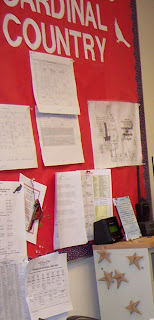 "Out of the window,
"Out of the window,I saw how the planets gathered
Like the leaves themselves
Turning in the wind."
Wallace Stevens, Domination of Black
It has only been two months since I began blogging. I have reflected on my professional life, made connections with educators and librarians in faraway places, and gained a nodding acquaintance with tools and applications whose existence I had not even suspected before.
My window has opened wide, indeed.
Carolyn Foote (Texas) has mentioned Journeys as a blog she would recommend, and I wholeheartedly return the favor: her Not So Distant Future explores the daily concerns of the teacher/librarian trying to move students in the direction of information fluency.
Beyond School's Clay Burell (Korea) has active student bloggers who participate in collaborative global learning projects. If our district technology cooperates, I hope to join in the fun, half a world away from our tiny rural school.
Also on another continent, Jo McLeay (Australia), of The Open Classroom, conducts Web 2.0 workshops for her colleagues and nurtures creativity through her class blogs.
Back in the U.S., Joyce Valenza (Pennsylvania) provides insight about 21st century searching, teaching, and learning on her NeverEndingSearch Blog.
And Sylvia Martinez (State of Washington) works through the Generation Yes Blog to help schools throughout the States integrate technology into the curriculum. Her advocacy of "student voice" is both eloquent and compelling.
This is just a sampling of the blogs I read daily, my self-directed professional development program.
To these individuals, and all the other intelligent, passionate writers who share their thoughts with us, I offer my sincere thanks.
"We are so often caught up in our destination that we forget to appreciate the journey, especially the goodness of the people we meet on the way. Appreciation is a wonderful feeling, don't overlook it."
Author Unknown
Author Unknown























